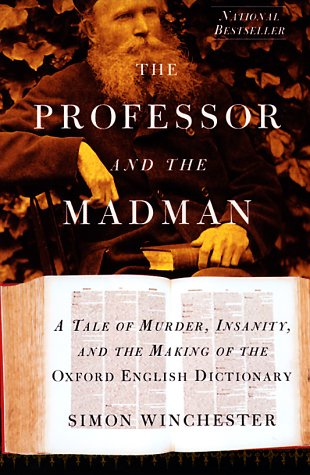
Mysterious (mistîe · ries), a. [f. L. mystérium Mysteryi + ous. Cf. F. mystérieux.]
1. Full of or fraught with mystery; wrapt in mystery; hidden from human knowledge or understanding; impossible
or difficult to explain, solve, or discover; of obscure origin, nature, or purpose.
It is known as one of the greatest literary achievements in the history of English letters. The creation of
the Oxford English Dictionary began in 1857, took seventy years to complete, drew from tens of thousands of
brilliant minds, and organized the sprawling language into 414,825 precise definitions. But hidden within
the rituals of its creation is a fascinating and mysterious story--a story of two remarkable men whose
strange twenty-year relationship lies at the core of this historic undertaking.
Professor James Murray, an astonishingly learned former schoolmaster and bank clerk, was the distinguished
editor of the OED project. Dr. William Chester Minor, an American surgeon from New Haven, Connecticut, who
had served in the Civil War, was one of thousands of contributors who submitted illustrative quotations of
words to be used in the dictionary. But Minor was no ordinary contributor. He was remarkably prolific,
sending thousands of neat, handwritten quotations from his home in the small village of Crowthorne,
fifty miles from Oxford. On numerous occasions Murray invited Minor to visit Oxford and celebrate his work,
but Murray's offer was regularly--and mysteriously--refused.
Thus the two men, for two decades, maintained a close relationship only through correspondence. Finally, in
1896, after Minor had sent nearly ten thousand definitions to the dictionary but had still never traveled from
his home, a puzzled Murray set out to visit him. It was then that Murray finally learned the truth about Minor--
that, in addition to being a masterful wordsmith, Minor was also a murderer, clinically insane--and locked up in
Broadmoor, England's harshest asylum for criminal lunatics.
The Professor and the Madman is an extraordinary tale of madness and genius, and the incredible obsessions of two men
at the heart of the Oxford English Dictionary and literary history. With riveting insight and detail, Simon Winchester
crafts a fascinating glimpse into one man's tortured mind and his contribution to another man's magnificent dictionary.
Quotes and thoughts while reading:
"And there are the girls---young, chocolate-skinned, ever-giggling naked girls with sleek wet bodies, rosebud nipples, long hair,
coltish legs, and scarlet and purple petals folded behind their ears---who play in the white Indian Ocean surf and who run,
quite without shame, along the cool wet sands on their way back home." (p 44) The girls, who the book says, drove William
Minor to madness. I don't know if I believe that, but I like the image it evokes, and the way it was written.
To begin the defeat of the secessionist army, General Grant began a campaign to sweep through the south, from Tennessee through
Georgia. The first real battle was on May 4th, and "cost some twenty-seven thousand lives in just fifty hours of savagery
and fire". Men were killed with muskets, but also brish fire, many with skin falling off were treated by doctors. Minor being
one of them. I believe from this experience, and the book elucidates upon the reaction of the Irish to this terrible battle,
was the impetus to his psychosis, whether it be schizophrenia, or PTSD, or a combination of both. (p 54)
"Shakespeare is thought to have drawn many of his classical allusions from a specialized Thesaurus that had been compiled
by a man named Thomas Cooper---its many errors are replicated far too exactly in the plays for it to be coincidence---and he is thought
also to have drawn from Thomas Wilson's Art of Rhetorique. But that was all; there was no other literary, linguistic, and
lexical conveniences available." (p 82)
Obsolete or rare words: abequitate, bulbulcitate, sullevation, archgrammacian, contiguate, commotrix(p 85) Do we think they are in my
Webster's dictionary? Nope.
An obsolete noun: aa: a stream or a watercourse (p 148)
cat·e·chize,ˈkadəˌkīz/, verb: (1) instruct (someone) in the principles of Christian religion by means of question and answer,
typically by using a catechism. (2) put questions to or interrogate (someone).
I think the end of the book offers an interesting notion, which is, if Dr. Minor hadn't been interned into an asylum, the process of making
the dictionary would have been different, but did he make it that much easier? I would like to see the book of words he built, but still,
it doesn't really make it OK to me, that a veteran, suffering from PTSD had to suffer in an asylum. He was a fascinating man, with the
capacity and power to work that diligently for so many years.
I don't know, I liked it, I enjoyed getting lost in the esoteric art that is making a dictionary, I think the process slightly blew my mind,
and yeah, I'm glad I read it.
© JKloor 2015 Books
